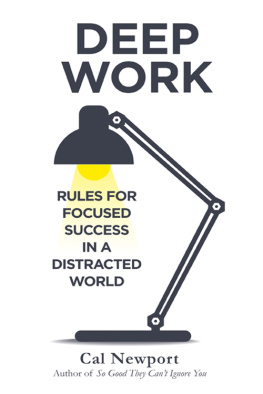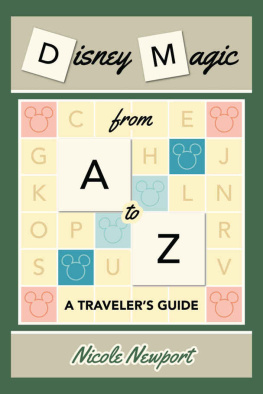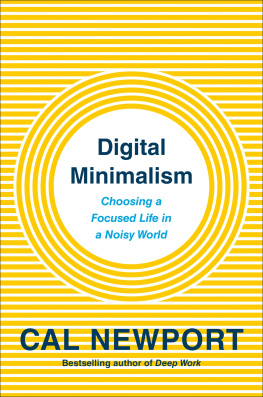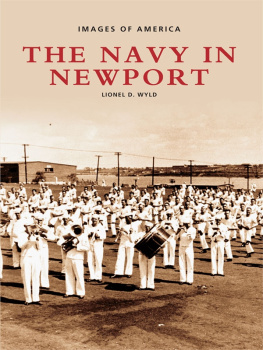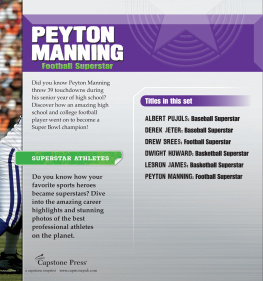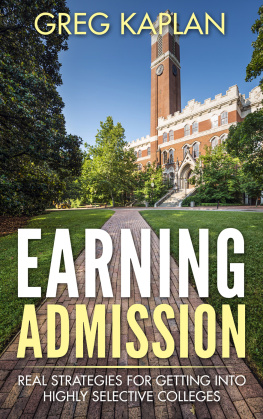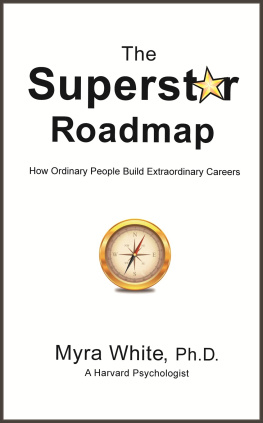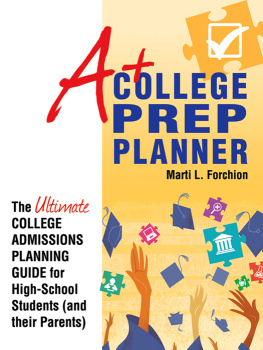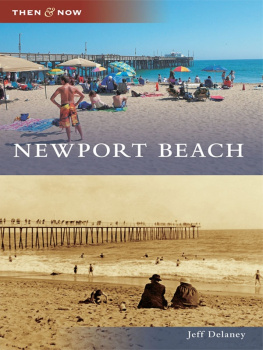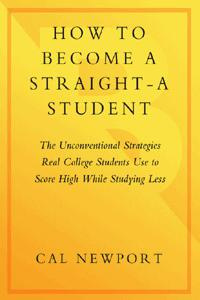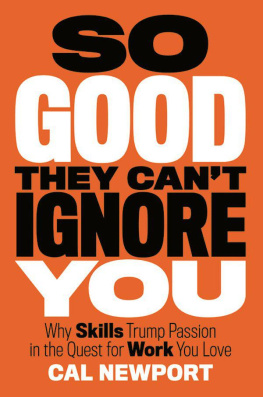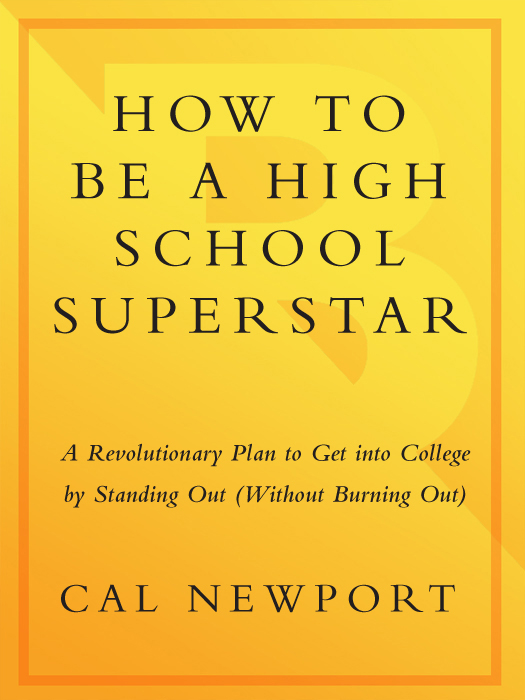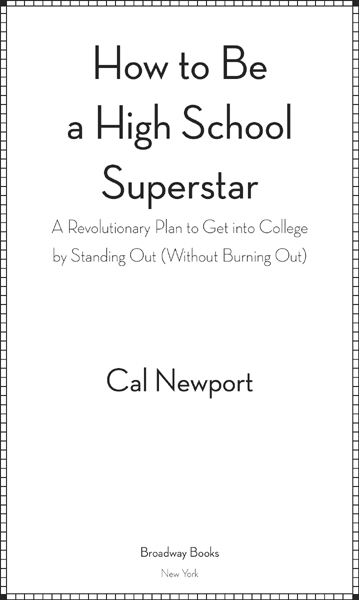ALSO BY CAL NEWPORT
How to Become a Straight-A Student
How to Win at College
To Julie
Contents
A NOTE FOR PARENTS
This book is written for high school students. Youll notice throughout that I directly address the student concerning his or her journey through high school and the admissions process. I highly recommend, however, that parents read the book as well. The strategies described in the chapters that follow work best if the entire household is involved.
Introduction:
Stanford Doesnt Take Students with Bs!
IN LATE spring 2004, a nervous student walked through the doors of the college counseling center at an elite Bay Area private high school. The student, whom Ill call Kara, had an appointment to discuss her college prospects. She entered a cramped office. The space was dominated by a desk, and what little area remained was taken up by a small round table. Multiracial clusters of happy students beamed at her from the college brochures pinned to the wall.
Kara took a seat at the table. Across from her sat her college counselor, a redheaded woman, pregnant and in her late twenties, flipping through a file. Kara thought she saw concern flash across the counselors face.
After the obligatory small talk, the counselor began the session. So, how are your grades going to be this semester? she asked.
Not as good as I hoped, probably some Bs, Kara answered.
The counselor glanced down at the list of schools where Kara wanted to apply, as if reconfirming, for the umpteenth time, that she had read it right. Stanford has a ten percent acceptance rate. Do you know what that means? she asked.
That one out of ten get in? Kara ventured.
It means that nine get rejected, the counselor replied, trying to keep her voice even and reassuring. She paused for a moment, then asked, Kara, do you think that youre better than those nine other people?
Kara began to stammer a response.
Kara, the counselor said pleadingly, Stanford doesnt take students with Bs. She pulled a sheet from the folder. Youre on the cross-country team, which is good. But youre not the president of any clubs, and with these mediocre grades youre not going to get into your reach schools. Youre just not. The people who apply to these schools have done amazing things.
Though it was left unsaid, Kara knew exactly the type of amazing student her counselor meantstudents like Elizabeth, who was Karas best friend and one of the high schools most impressive seniors. Elizabeth was a master at the college admissions game, someone Kara later described to me as the poster child for students who do lots of uninteresting things. Elizabeth was president of the key club, played piano and varsity tennis, competed in math competitions, and belonged to what Kara described as lots of boring clubs that I would never join.
When it came to grades, nothing short of straight As would satisfy Elizabeth. She was maniacal about gaming courses, figuring out which would consistently yield As in exchange for hard work and avoiding those that relied too much on insight or natural ability (attributes that scared her off because they could not be acquired by raw effort). Like many students at her high school, she suffered from what Kara called gratuitous AP taking. By contrast, Kara, much to the horror of her counselor, had only taken three advanced placement courses. Keep in mind that her school had practically coronated a student who had broken the state record for the most APs taken by a freshman.
In the first few weeks of that spring semester, Elizabeth had dropped a course because she got a B on the first test, which increased the risk of her missing a full A for her final grade. She then pleaded with Kara to drop a linear algebra course that was giving her trouble. Take AP stats instead, she said. All you have to do is a crapload of homeworkthats forty percent of the grade; if you do it all they give you an A. Kara ignored this advice. She liked linear algebra.
Elizabeth, on the other hand, didnt like much at all about high school. As Kara recalls: Elizabeth was working all the time; she had no social life; she was just so freakin diligent! She was also, as you might imagine, stress-addled and often upset or anxious. But this is the approach that most students at her elite high school swore by. Its also the approach followed by tens of thousands of other talented but overworked students across the country. It persists for one simple reason: if youre not an amazing athlete or a genius, and if your parents arent capable of donating a new library to Harvard, demonstrating time-consuming commitment to lots of things has been deemed the only reliable way to maximize your admissions chances. Its a brutal game, and its no fun to play, but at least the rules are clear.
Then along came Kara.
Spooked by the grim encounter with her college counselora meeting that concluded with the counselor pulling out the applications for the less-competitive California public universitiesKara scraped together enough money to apply to twenty-one different schools. (Her dad refused to pay that many application fees.)
I was freaked out that I wasnt going to get in anywhere, she recalls.
But heres the thing: Kara did get in. In fact, she got into twenty of the twenty-one schools she applied to, including MIT, Caltech, Columbia, Cornell, Berkeley, Johns Hopkins, and, of course, Stanfordproving, to the surprise of her counselor, that those schools do occasionally accept students with Bs.
Karas long string of acceptances surprised her classmates because she had refused to play the standard admissions game. Kara had the lowest GPA of any student from her school who had ever been accepted into MIT (where she now attends). She took a reasonable course load and avoided a crushing extracurricular schedule. Unlike most of her competitive peers, Kara actually enjoyed high school.
I was perceived as the relaxed kid in my school, she told me with a sheepish grin. It was as if she were admitting a crime.
As you might imagine, Karas success proved disruptive. The entire motivationthe raison dtrefor the brutal schedules of students like Elizabeth is their unshakable confidence that doing more things than the thousands of other applicants applying to the same schools is the only way to stand out. Kara shattered this confidence, and in doing so she provided a glimmer of hope for stressed students everywhere: it might be possible to stand out without burning out.
Meet the Relaxed Superstars
Kara is part of a little-known subculture of students that I call the relaxed superstars. These are students who live relaxed and happy high school lives yet still breeze into their reach schools. Like Kara, they challenge a lot of what we thought was true about the college admissions process.
Most relaxed superstars pay little attention to college admissions until application deadlines loomthe topic doesnt dominate their lives the way it does for so many of their peers. They dismiss the belief that you should suffer through the hardest possible course schedules; instead, they build reasonable schedules that provide challenge but still leave plenty of free time. They abhor crowded lists of extracurricular activities; instead, they focus on a small number of genuinely interesting pursuits. Perhaps the most striking trait of these students is their happiness. Spending time with them, I have been astonished by how much they seemed to enjoy their lives. They flat-out reject the idea that happiness must be deferred until after you get accepted into college, and they prove that living a relaxed and engaging life can actually make you


